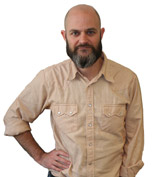Project Description

RESEARCH AREAS:
Philosophy of Mind
Cognitive Science
Consciousness
CONTACT:
TIM BAYNE
Professor;
Department of Philosophy, Monash University
Tim Bayne is a philosopher of mind and cognitive science, with a particular interest in the nature of consciousness. One focus of current research concerns the measurement of consciousness, and the question of whether we can identify well-grounded ways of detecting consciousness in brain-damaged individuals, infants and non-human animals. A second focus of current research concerns the ways in which the structural features of consciousness (such as its unity) can guide the search for a plausible account of its neural basis. A third focus of Tim’s research concerns the notion of a ‘level of consciousness’. Although the phrase is a common, the notion of a level of consciousness is obscure, and it is far from clear what a level of consciousness is meant to be. Tim is currently developing an account of levels of consciousness that attempts to do justice to the various ways in which this notion is employed in the science of consciousness. Tim also works on a number of issues in the philosophy of psychiatry, exploring questions relating to the etiology of delusions and the nature of psychiatric kinds.
My research engages with a variety of issues that fall at the intersection of the philosophy of mind and the sciences of the mind.
One research focus concerns the epistemology of consciousness. Here I am interested in the question of how robust measures of consciousness might be identified. I have been collaborating with Prof. Nicholas Shea (King’s College, London) to explore the projects of the “natural kind” approach for studying consciousness. The natural kind approach treats consciousness as a natural kind, and recommends that the search for objective measures of consciousness be modeled on the search for objective measures of other natural kinds (such as gold and hepatitis). Addressing the questions raised by the natural kind approach requires engaging with a number of issues in epistemology, metaphysics and the philosophy of language. Of particular relevance here are questions about how the epistemology of 3rd -person access to consciousness should be related the epistemology of 1st-person access to consciousness. Philosophers have traditionally taken 1st-person access to be privileged over 3rd-person access, but the natural kind approach threatens to undermine this assumption.
A second research focus concerns the ways in which the structural features of consciousness can guide the search for a plausible account of its neural basis. Previous work of mine has focused on the ways in which the unity of consciousness constrains theories of consciousness (The Unity of Consciousness, OUP). My current research focuses on ways in which accounts of the admissible contents of consciousness can be used to evaluate theories of consciousness. Here, I am particularly interested in high-level perceptual content, the nature of conscious thought, and the question of whether there is a distinctive kind of cognitive phenomenology.
A third research focus concerns the notion of a level of consciousness. Although much of the science of consciousness has focused on fine-grained contents of consciousness, it is increasingly clear that a full understanding of consciousness needs to reckon with the fact that consciousness can take the form of various ‘levels’. But although levels talk is now ubiquitous in consciousness science, it has received little systematic analysis. Together with Professor Jakob Hohwy (Monash) and Adrian Owen (BMI, Western) I am examining how the notion of a level of consciousness is understood in the science of consciousness, and how theories of consciousness ought to accommodate the various levels of consciousness.
I have also contributed to a number of debates in the philosophy of psychiatry, focusing in particular on the nature and etiology of delusion.
Are There Islands of Awareness? Bayne, T., Seth, A. K. & Massimini, M., Jan 2020, In : Trends in Neurosciences. 43, 1, p. 6-16
Split-Brain: What We Know Now and Why This is Important for Understanding Consciousness de Haan, E. H. F., Corballis, P. M., Hillyard, S. A., Marzi, C. A., Seth, A., Lamme, V. A. F., Volz, L., Fabri, M., Schechter, E., Bayne, T., Corballis, M. & Pinto, Y., Jun 2020, In: Neuropsychology Review. 30, 2, p. 224-233 10 p.
Ensemble representation and the contents of visual experience Bayne, T. & McClelland, T., 2019, In: Philosophical Studies. 176, 3, p. 733-753 21 p.
Dimensions of consciousness and the psychedelic state Bayne, T. J. & Carter, O., 2018, In: Neuroscience of Consciousness. 4, 1, p. 1-8 8 p.
On the axiomatic foundations of the integrated information theory of consciousness Bayne, T. J., 2018, In: Neuroscience of Consciousness. 4, 1, p. 1-8 8 p.
Post-comatose disorders of consciousness Peterson, A. & Bayne, T., 2018, The Routledge Handbook of Consciousness. Gennaro, R. J. (ed.). Abingdon Oxon UK: Taylor & Francis, p. 351-365 15 p. (The Routledge Handbooks in Philosophy).
